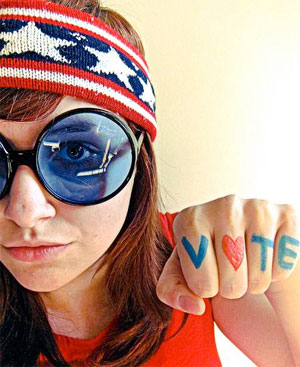 Two years ago on November 6, 2012, Facebook and Twitter feeds exploded with Instagram pics of “I Voted” stickers attached to millions of smiling young people. There’s another election approaching within a few days, with major implications, and many are wondering if those same throngs of young people will show up.
Two years ago on November 6, 2012, Facebook and Twitter feeds exploded with Instagram pics of “I Voted” stickers attached to millions of smiling young people. There’s another election approaching within a few days, with major implications, and many are wondering if those same throngs of young people will show up.
Eh…don’t bet on it.
Short Lines in 2014?
The last presidential election (Obama vs. Romney) was electric, with young people turning out in droves to cast their vote. In fact, exit polls showed that the 18-29-year-old voting bloc represented 19% of the votes cast on Election Day 2012, an increase of 1% over 2008’s numbers! This increase was in spite of an overall decreasein total votes cast that year; according to the Bipartisan Policy Center, voter turnout in 2012 fell to approximately 57% of the population, down from roughly 62% in 2008.
No one can deny the impact of young voters in America: once again, the “youth vote” was responsible for Barack Obama’s victory; he garnered 60% of it, while challenger Mitt Romney could only muster 36% of that demographic.
But that was a “presidential” election. This is “only” a midterm election. That was then. This is now.
Just about every pollster and pundit is predicting a different (read lower) level of engagement by young people during this year’s midterm elections to be held on Tuesday, November 4, 2014. For example, the Harvard Institute of Politics has found that only 23% of young people claim to “definitely be voting.” John Della Volpe, the Institute’s polling director, said, “It’s been clear for some time now that young people are growing more disillusioned and disconnected from Washington.”
Even some politicians are expecting low voter turnout for this year’s elections.
But it’s no secret that this midterm election could have huge implications on our nation’s future. The current Congress, with a Democrat-controlled Senate and a Republican-held House, could undergo a massive shift. Moreover, a majority of the nation’s governors are up for re-election. In addition to the future of American politics, one of the items on the ballots in several states, including my own in Florida, is the legalization of marijuana. The District of Columbia, three states, and the territory of Guam, will vote on various shades of legalization. Tack on healthcare issues, immigration, the economy, and foreign affairs policy, and this year’s midterm elections become incredibly significant.
Young people who have a voice in this election cycle should definitely use it.
Connecting the Plugged-In Generation
I understand the challenge inherent in this task: help young people care enough about the issues at hand to stand in line long enough to cast a vote that’s (literally) one-in-a-million(s). That’s a daunting endeavor regardless of the circumstances. But here are a few ideas, and practical suggestions, to help you move young people from indifference to a voting center.
- Encourage your teenagers to vote. Granted, most teenagers aren’t old enough to vote, but those who do qualify should seize their privilege and exercise their right. Besides, it won’t hurt younger teenagers to hear a repetitious message on how important voting is. One way is to encourage their participation is to research how many countries don’t have open elections for their citizens. This will open their eyes to the distinct privilege they have as Americans.
- Educate them in the overall process. No, I’m not suggesting you outline the complete order of presidential succession, but it wouldn’t hurt them to understand the difference between a Democrat and a Republican (or an Independent for that matter). Approach the task with as much impartiality as possible, and help them understand the pros and cons of each. One of the best ways to help teenagers understand politics is to ask them a few dialogue-provoking questions. Here are some to get you going:
- What’s most important to you in this election?
- How important is it to you that a candidate agrees with your stances and/or values?
- What happens if a candidate who is pro-choice is elected? Pro-life?
- Where does a candidate stand on the legalization of marijuana?
- Make sure their faith informs their politics. It’s easy to get this reversed. At all costs, don’t let that happen! Let’s be honest; a lot of American politics has moved – and is currently moving – away from a biblical standard on values, ethics, and morals. We teach our kids to let their faith inform their relationships, their attitudes, and their character, do we not? Then why shouldn’t our faith inform our political involvement? Warning: you’ll have to help them in this arena. After all, just about every politician claims to have God on his/her side!
This effort isn’t just for the midterm elections in November of 2014. By helping our teenagers understand our system and their responsibility, we are actually helping them build a foundation that will last for the rest of their lives. And that’s a great thing for our nation.
David R. Smith
David R. Smith is the author of several books including Christianity... It's Like This and speaks to parents and leaders across the U.S. David is a 15-year youth ministry veteran, now a senior pastor, who specializes in sharing the gospel, and equipping others do the same. David provides free resources to anyone who works with teenagers on his website, DavidRSmith.org David resides with his wife and son in Tampa, Florida.



